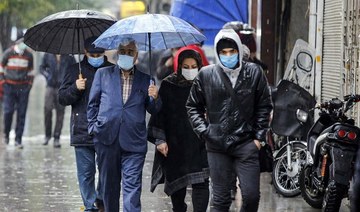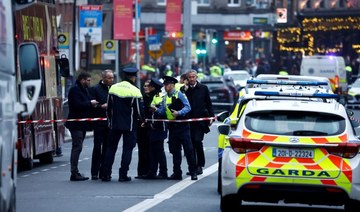LONDON: The Covid-19 vaccine developed by the British drugs group AstraZeneca and the University of Oxford has achieved a "winning formula" for efficacy, the company's chief executive said on Sunday.
The vaccine, currently being evaluated by Britain's independent medicines regulator, provides "100 percent protection" against severe Covid disease requiring hospitalisation, Pascal Soriot said in an interview with the Sunday Times newspaper.
He added he believes trials will show his firm has achieved a vaccine efficacy equal to Pfizer-BioNTech at 95 percent and Moderna at 94.5 percent.
"We think we have figured out the winning formula and how to get efficacy that, after two doses, is up there with everybody else," the chief executive said, while saying only that data would be published at "some point".
The UK government announced on December 23 that the developers of the Oxford-AstraZeneca vaccine had submitted their data to the Medicines and Healthcare products Regulatory Agency (MHRA).
Approval is expected to be granted Monday to roll out the jab, The Sunday Telegraph newspaper reported.
The Pfizer-BioNTech vaccine was the first coronavirus shot to be authorised for use by the UK's independent medicines regulator and has been given to 600,000 of the country's most vulnerable people since last month.
Earlier trials had shown varying outcomes in the AstraZeneca shot's efficacy. The vaccine intially showed an average 70 percent effectiveness but that level jumped to 90 percent depending on dosage.
Behind this average figure from large-scale trials in the UK and Brazil was a 62 percent effectiveness for those who were vaccinated with two full doses of the shot.
For volunteers who received a half-dose first and then a full dose one month later, however, the vaccine was found to have 90 percent efficacy.
Soriot said he was "surprised" by the initial findings. "We would have preferred a simpler set of results," he added.
The lack of clarity and transparency over the discrepancy in the results was widely criticised. Soriot said he had not expected the pushback that followed.
"We assumed people would be a bit disappointed, that's for sure," he said. "But we didn't expect that storm".
Great hopes have been placed in the AstraZeneca shot, originally based on a weakened version of a chimpanzee virus, because of its low cost.
AstraZeneca's vaccine also enjoys a logistical advantage over the Pfizer-BioNTech alternative, as it can be stored, transported and handled at normal refrigerated conditions of between two and eight degrees Celsius (36-46 Fahrenheit) for at least six months.
That is a far cry from the -70C needed for Pfizer/BioNTech's offering and could allow use of the existing refrigerated supply chain to cut costs.
In a vote of confidence for its homegrown vaccine, the bulk of Britain's requirements are expected to be met by the jab.
The government has ordered 100 million doses, with 40 million doses scheduled to be available by the end of March.
UK officials will hope that confidence is rewarded, not least because the country has been one of the countries most affected by the pandemic with more than 70,000 deaths.
A surge in cases has hit nationwide over the past week, falling especially on the southeast of England and blamed on a new strain of the virus believed to be more infectious, which was first identified in the UK.
According to one British study the strain is 50 percent to 74 percent more contagious.
In an effort to contain the spread of the disease, millions across Britain were placed under tougher lockdown restrictions that came into force on 26 December.
Dozens of countries have also imposed travel restrictions on the UK to stop the spread of the new strain.
Writing in the Mail on Sunday newspaper, Finance Minister Rishi Sunak acknowledged it had been "a tough year for everyone in this country".
However, he added that "the early roll-out of vaccines - and the incredible work of our scientists and NHS - means we can now see light at the end of the tunnel".
Nearly 200 million doses of the AstraZeneca vaccine will be made before the end of the year, the UK drug manufacturer has said, and more than 700 million globally by the end of March next year.
AstraZeneca COVID-19 vaccine has ‘winning formula’: CEO
https://arab.news/mxj54
AstraZeneca COVID-19 vaccine has ‘winning formula’: CEO

- The vaccine provides 100% protection against severe COVID-19 disease requiring hospitalisation: Soriot
- Approval is expected to be granted Monday to roll out the jab, The Sunday Telegraph newspaper reported
US blames Rwanda for deadly attack on displaced camp in DR Congo

- DR Congo government spokesman Patrick Muyaya on Friday had also accused “the Rwandan army and its M23 terrorist supporters” of being responsible in a statement on X, the former Twitter
WASHINGTON: The United States has accused Rwanda of involvement in a deadly attack on a camp for displaced people in the eastern Democratic Republic of Congo, a claim dismissed as “absurd” by Kigali on Saturday.
At least nine people were killed in blasts on Friday in the camp on the outskirts of the city of Goma, local sources said.
“The United States strongly condemns the attack (Friday) from Rwanda Defense Forces and M23 positions on the Mugunga camp for internally displaced persons in eastern Democratic Republic of the Congo,” State Department spokesman Matthew Miller said in a statement.
Miller said the United States was “gravely concerned” by the expansion in DR Congo of Rwandan forces and the M23, a mostly Tutsi group that resumed its armed campaign in the vast, long turbulent DR Congo in 2021.
“It is essential that all states respect each other’s sovereignty and territorial integrity and hold accountable all actors for human rights abuses in the conflict in eastern DRC,” he said.
DR Congo government spokesman Patrick Muyaya on Friday had also accused “the Rwandan army and its M23 terrorist supporters” of being responsible in a statement on X, the former Twitter.
Rwandan government spokesperson Yolande Makolo described the US comments as “ridiculous,” in a post on X.
“How do you come to this absurd conclusion? The RDF, a professional army, would never attack an IDP camp,” she said.
“Look to the lawless FDLR and Wazalendo supported by the FARDC (the Congolese armed forces), for this kind of atrocity,” she added.
The FDLR, or Democratic Forces for the Liberation of Rwanda, is an armed ethnic Hutu group operating in Congo’s east for 30 years, while Wazalendo is fighting the M23 alongside the Congolese army.
The origin of Friday’s blasts has not been clearly established.
According to witnesses, government forces positioned near the camp had been bombarding the rebels on hills further west since early morning and, according to a civil society activist, “the M23 retaliated by throwing bombs indiscriminately.”
“Horror in its most serious form! A bomb on civilians, deaths, children! A new war crime,” said the government spokesman Muyaya.
The United States has repeatedly backed Kinshasa’s claims that Rwanda has backed the M23, but Miller’s statement amounts to an unusually direct implication.
France’s President Emmanuel Macron also this week called on Rwanda to end its backing for M23 rebels and withdraw its troops from DR Congo territory.
President Paul Kagame in turn has demanded that the DR Congo act against Hutu forces over ties with the perpetrators of Rwanda’s 1994 genocide, which mostly targeted Tutsis.
The United States has repeatedly sought to mediate between the two sides, with intelligence chief Avril Haines in November visiting DR Congo and Rwanda and announcing a pathway to reduce tensions.
Secretary of State Antony Blinken this year met Kagame and voiced hope that Rwanda was willing to engage in diplomacy.
Netherlands remembers World War Two dead amid tight security due to Gaza war
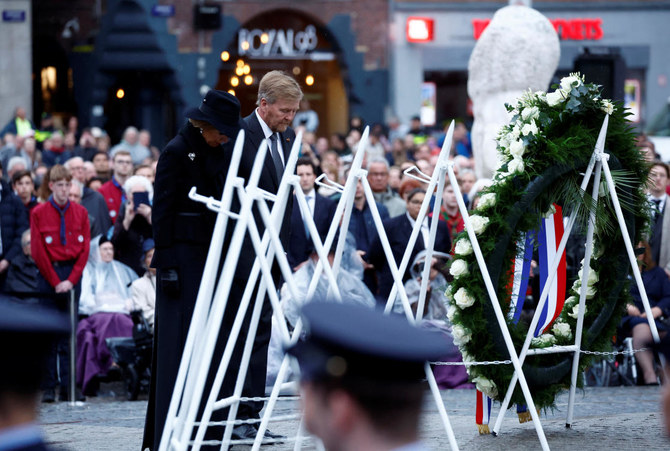
- Normally some 20,000 people attend the Dam commemoration
- Earlier this week municipal authorities announced unprecedented security measures to keep the ceremony safe and avoid possible disruptions linked to the Israel-Hamas war
AMSTERDAM: Dutch King Willem-Alexander and Prime Minister Mark Rutte joined around 4,000 people on Saturday for the country’s annual World War Two remembrance ceremony amid restricted public access and heightened security due to the war in Gaza.
The ceremony on Amsterdam’s central Dam square, with the traditional two minutes of silence at 8 p.m. (1800 GMT) to commemorate the victims of World War Two, passed smoothly despite fears that there might be protests.
Normally some 20,000 people attend the Dam commemoration without having to register. But earlier this week municipal authorities announced unprecedented security measures to keep the ceremony safe and avoid possible disruptions linked to the Israel-Hamas war.
At the opening of a Holocaust Museum in Amsterdam in March, pro-Palestinian protesters opposed to Israel’s military campaign in Gaza set off fireworks and booed Israeli President Isaac Herzog as he arrived on a visit.
Every town and the city in the Netherlands holds its own remembrance ceremony on May 4 and tens of thousands of people attend the events. The Netherlands then marks on May 5 the anniversary of its liberation from Nazi occupation in 1945.
Drone footage shows Ukrainian village battered to ruins as residents flee Russian advance
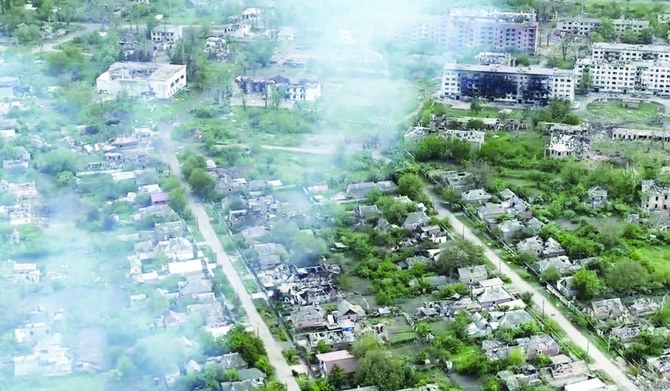
- Residents have scrambled to flee the village, among them a 98-year-old woman who walked almost 10 kilometers (6 miles) alone last week, wearing a pair of slippers and supported by a cane, until she reached Ukrainian front lines
KYIV: The Ukrainian village of Ocheretyne has been battered by fighting, drone footage obtained by The Associated Press shows. The village has been a target for Russian forces in the Donetsk region of eastern Ukraine.
Russian troops have been advancing in the area, pounding Kyiv’s depleted, ammunition-deprived forces with artillery, drones and bombs. Ukraine’s military has acknowledged the Russians have gained a “foothold” in Ocheretyne, which had a population of about 3,000 before the war, but says that fighting continues.
Residents have scrambled to flee the village, among them a 98-year-old woman who walked almost 10 kilometers (6 miles) alone last week, wearing a pair of slippers and supported by a cane, until she reached Ukrainian front lines.
FASTFACT
Ukraine’s military has acknowledged the Russians have gained a “foothold” in Ocheretyne, which had a population of about 3,000 before the war, but says that fighting continues.
Not a single person is seen in the footage, and no building in Ocheretyne appears to have been left untouched by the fighting. Most houses, apartment blocks and other buildings look damaged beyond repair, and many houses have been pummeled into piles of wood and bricks. A factory on the outskirts has also been badly damaged.
The footage also shows smoke billowing from several houses, and fires burning in at least two buildings.
Elsewhere, Russia has in recent weeks stepped up attacks on Kharkiv, Ukraine’s second-largest city, in an attempt to pummel the region’s energy infrastructure and terrorize its 1.3 million residents.
Four people were wounded and a two-story civilian building was damaged and set ablaze overnight after Russian forces struck Kharkiv, in northeastern Ukraine, with exploding drones, regional governor Oleh Syniehubov said Saturday.
The four, including a 13-year-old, were hurt by falling debris, he said on the Telegram messaging app.
Russian state agency RIA reported Saturday reported that Moscow’s forces struck a drone warehouse in Kharkiv that had been used by Ukrainian troops overnight, citing Sergei Lebedev, described as a coordinator of local pro-Moscow guerrillas. His comments could not be independently verified.
Syniehubov said Russia also bombed Kharkiv on Friday, damaging residential buildings and sparking a fire. An 82-year-old woman died and two men were wounded.
Ukraine’s military said Russia launched a total of 13 Shahed drones at the Kharkiv and Dnipropetrovsk regions of eastern Ukraine overnight, all of which were shot down by Ukrainian air defenses.
Students in Ireland, Switzerland join the protest wave over Gaza
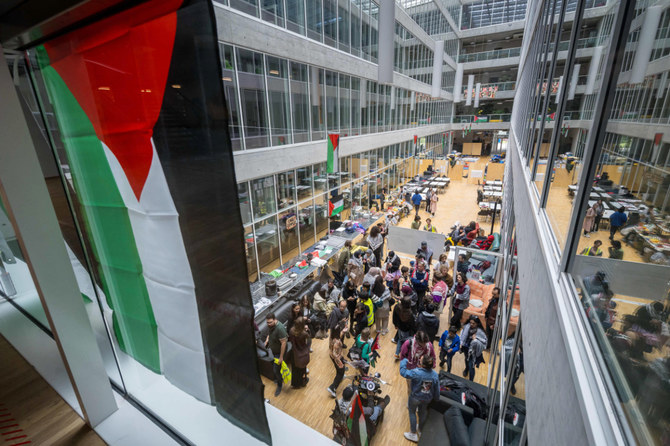
- Dublin students build encampment, forcing university to restrict campus access and close Book of Kells exhibition
- Israel has killed more than 34,000 Palestinians in Gaza, mostly women and children, according to the health ministry in the Hamas-run territory
DUBLIN: Students at Trinity College Dublin and Lausanne University in Switzerland have staged occupations to protest against Israel’s war in Gaza, joining a wave of demonstrations sweeping US campuses.
In Dublin, students built an encampment on Friday, forcing the university to restrict campus access on Saturday and close the Book of Kells exhibition, one of Ireland’s top tourist attractions.
The camp was set up after the students’ union said the university had fined it €214,000 ($230,000) for losses caused by protests in recent months, not exclusively over Gaza.
The protesters were demanding that Trinity cut academic ties with Israel and divest from companies with ties to Israel.
BACKGROUND
The protesters were demanding that Trinity College Dublin cut academic ties with Israel and divest from companies with ties to Israel.
Students’ union president Laszlo Molnarfia posted a photograph of benches piled up at the entrance to the building housing the Book of Kells, an illuminated manuscript created by Celtic monks in about 800 AD.
Trinity College said it had restricted access to students, staff, and residents to ensure safety and that the exhibition would be closed on Saturday.
More than 34,600 Palestinians have been killed in Israel’s seven-month-old assault on the Gaza Strip, say health officials in the enclave.
The war began when Hamas militants attacked Israel on Oct. 7.
Pro-Palestinian protests have also been held at universities in Australia and Canada.
In Lausanne, around 100 students occupied a building to back demands, including an end to scientific cooperation with Israel.
“Palestinians have been dying for over 200 days, but we are not being heard,” one protester told Swiss television on Saturday.
“There’s a global movement to get governments to take action, but it’s not happening. That’s why we want to get universities involved now.”
The university said the occupation could continue until Monday, provided it did not disrupt work on campus.
“We universities are not called upon to take political stands,” the university’s rector, Frederic Herman, told RTS radio.
Last week, the head of Trinity College, Linda Doyle, said it was reviewing its investments but that it was for individual academics to decide whether to work with Israeli institutions.
Sadiq Khan, Pakistani immigrant bus driver’s son, makes history by winning third term as London mayor
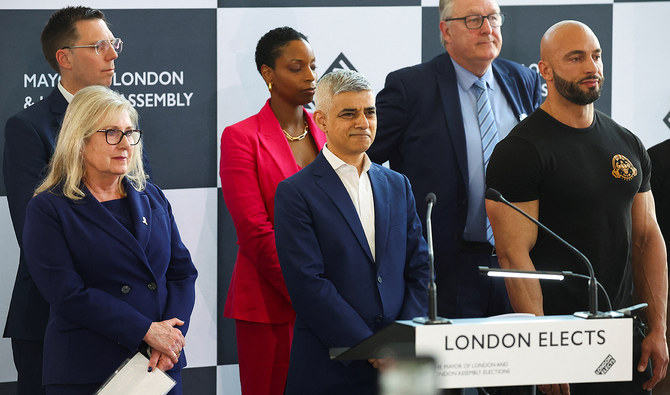
- Khan, an official with global renown, became the first Muslim mayor of a Western capital when elected in 2016
- Born in London in 1970, he grew up in public housing the Tooting area and slept in a bunk-bed until he was 24
LONDON: Sadiq Khan, who was Saturday re-elected for a record third term as London mayor, rose from humble roots to spar with world leaders and bring consequential change to the British capital.
The 53-year-old Labor party politician – a former human rights lawyer brought up on a London public housing complex – comfortably defeated Conservative rival Susan Hall for a third stint at City Hall.
He now overtakes predecessor Boris Johnson as the longest-serving holder of the post, which notably has powers over the emergency services, transport and planning in the city of nearly nine million.
Victory continues a remarkable journey for the Pakistani immigrant bus driver’s son, who became the first Muslim mayor of a Western capital when initially elected in 2016.
As mayor, he has made a name for himself as a vocal critic of Brexit and successive Conservative prime ministers, including Johnson, as well as for a feud with former US president Donald Trump.
The pair became embroiled in an extraordinary war of words after Khan criticized Trump’s travel ban on people from certain Muslim countries.
Trump then accused Khan of doing a “very bad job on terrorism” and called him a “stone cold loser” and a “national disgrace.”
The mayor in turn allowed an infamous blimp of Trump dressed as a baby in a nappy to fly above protests in Parliament Square during his 2018 visit to Britain.
“He once called me a stone cold loser. Only one of us is a loser, and it’s not me,” Khan told AFP during his 2021 campaign.
But Khan’s own tenure has not been without its controversies, particularly over last year’s expansion of an Ultra-Low Emission Zone into the largest pollution-charging scheme in the world.
The daily toll on the most-polluting vehicles prompted a fierce backlash in outer boroughs of Greater London, with anger at the extra financial burden during a cost-of-living crisis.
Khan has also been criticized for failing to get to grips with high levels of knife crime and since last year, his handling of large weekly pro-Palestinian protests.
Born in London in 1970 to parents who had recently arrived from Pakistan, Khan was the fifth child out of seven brothers and one sister.
He grew up in public housing in Tooting, an ethnically mixed residential area in south London, and slept in a bunk-bed until he was 24.
His modest background plays well in a city that is proud of its diversity and loves a self-made success story.
Khan still regularly recalls how his father drove one of London’s famous red buses, and his mother was a seamstress.
He is a handy boxer, having learnt the sport to defend himself in the streets against those who hurled racist abuse at him, and two of his brothers are boxing coaches.
He initially wanted to become a dentist, but a teacher spotted his gift for verbal sparring and directed him toward law.
He gained a law degree from the University of North London and started out as a trainee lawyer in 1994 at the Christian Fisher legal firm, where he was eventually made a partner.
He specialized in human rights, and spent three years chairing the civil liberties campaign group Liberty.
He represented Louis Farrakhan, leader of the Nation of Islam movement, and Babar Ahmad, a mosque acquaintance who was jailed in the United States after admitting providing support to the Taliban regime in Afghanistan.
Khan joined Labor aged 15 when Conservative prime minister Margaret Thatcher was in her pomp.
He became a local councilor for Tooting in the Conservative-dominated Wandsworth local borough in 1994, and its member of parliament in 2005.
He still lives in the area with his lawyer wife Saadiya and their two teenage daughters.
Labor prime minister Gordon Brown made him communities minister in 2008 and he later served as transport minister, becoming the first Muslim minister to attend Cabinet meetings.
In parliament, he voted for gay marriage – which earned him death threats.
As mayor, he vowed to focus on providing affordable homes for Londoners and freezing transport fares, but – like many in power around the world – saw his agenda engulfed by the pandemic.
He is London’s third mayor after Labor’s Ken Livingstone (2000-2008) and Johnson (2008-2016), with widespread speculation he could eventually try to follow in his predecessor and become prime minister.



